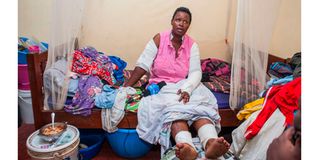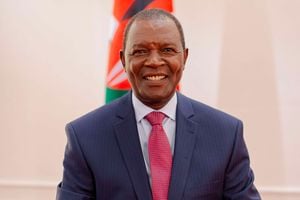Embakasi fire victims lament empty promises by State officials

Maria Nyangige at her house in Embakasi, Nairobi, on February 20, 2024. She passed away on February 21, 2023.
The February 1 gas explosion that rocked Embakasi’s Mradi Village caught Maria Nyangige on her way home.
The single mother of two earns her living selling food and snacks in the neighbourhood. She had just finished making dough for the next day when the settlement erupted in a huge ball of flames.
A loud bang preceded a scene straight from hell as a orange flames streaked the night sky, black smoke billowed, and the very air shimmered in the searing heat. She ran to her house looking to save her youngest child but never got there.
She remembers her body covered in fire. The pain was so excruciating, she recalls, that she could not move. She was burned from the neck down, her entire back ravaged by the inferno.
In an interview with the Nation, she told of a world turned topsy-turvy. The fire seared the fabric that held her life together. With each sunrise, she now watches helplessly as her life fades away.
She was the breadwinner, but now she is bedridden, wounded, bandaged and in pain. Her entire livelihood depended on her health. Now, every bill she used to pay is in arrears, including rent and school fees. She lacks even food and money to buy the painkillers she desperately needs to manage the pain. Her babies sometimes sleep hungry, too.
“I live one day at a time now,” she said. “I don’t know how long I'll be in this state before I heal, or if I'll ever get my life back to normal."
After the fire, several humanitarian and government officials visited and made promises of financial aid and compensation. But they remained just that: empty promises.
Martin Simiyu Walumbe, a Kakamega native, made a living as a mechanic in Nairobi and lived in Mradi. He died on the spot when the huge fire tore through his bonnet, his roommate David Mukwana told the Nation. On Tuesday, his neighbours bid farewell to a man they described as jovial, selfless and humble. His body lay in the coffin draped in white linen. His colourful portrait reminded them of his warm personality.
"He overstayed in the mortuary because we had to pay the bills," said Mr Mukwana. Government officials had promised to waive the hospital bills, but they are yet to make good on their word.
Mr Philip Wafula narrowly survived but he has never returned to work . He has occasional headaches, but “I’m not badly off compared to my neighbours who are disabled.”
Sandwiched between the Go-Downs and the posh Nyayo Estate in Embakasi, Mradi is a low-income residential area. Most of the residents are casual workers from nearby companies who live from hand to mouth. Their once modest livelihoods were reduced to nothing in a matter of seconds.
Mr Wafula also questioned the government’s official death toll.
"The injured were over 500. You can go around and take a head count. But the government put it a little over 300," he said.
The issue of compensation remains a niggling one. According to Mr Jacob Omondi, a survivor, some victims' names were deliberately omitted from the list.
"Whoever prepared the list included the names of their friends instead of the exact names of the victims," he explained.
Reached for comment, Embakasi East MP Babu Owino said the money was paid to everyone whose name was recorded.
"The county government promised us Sh280,000 in donations that were never delivered," Mr Owino told the Nation.
"We had Sh4 million worth of contributions," he said, explaining that opposition leader Raila Odinga contributed Sh1 million, while other lawmakers contributed Sh1 million.
Mr Owino says he received Sh131,000 from the payroll he issued, which was part of his Sh2 million contribution.





